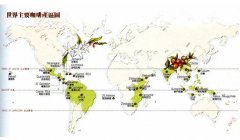How much do you know about the botany of coffee?
According to our national standards, the classification of coffee is mainly divided into the following five varieties.

1. Large seed coffee, that is, Liberian species. Originated in Liberia, Africa. The cultivated area is small, and there is also a small amount of planting in Hainan Province, which is suitable for growing in areas with low altitude and high temperature.
2. Small seed coffee, that is, Arabian species. It is native to Ethiopia and is the main cultivated species in the world. China is mainly distributed in Yunnan and Zhanjiang, Guangdong. This kind is cold-resistant, drought-resistant, mellow smell and good drinking quality, but it is easy to be infected with leaf rust.
3. Medium seed coffee, that is, Robasta species. It is commonly said to be native to the rainforest region of the Congo in Africa. The cultivated area is second only to the small seed species, and it is mainly cultivated in Hainan Province in China. This species is not resistant to strong light, wind and drought, and is weak in cold resistance. But it has strong disease resistance and is not easy to be infected with leaf rust. The product has strong drinking flavor and strong irritation.
4. Alabata species. It is a new species cultivated by the French Coffee and Cocoa Institute in 1962, which was crossbred between tetraploid coffee and small seed coffee treated with colchicine in C ô te d'Ivoire, Africa.
5. Esselsa. Native to the Charlie River Basin in West Africa, it has not been cultivated in China.
The most suitable variety for cultivation in Yunnan Province of China is Arabian species (commonly known as small seed species).
Important Notice :
前街咖啡 FrontStreet Coffee has moved to new addredd:
FrontStreet Coffee Address: 315,Donghua East Road,GuangZhou
Tel:020 38364473
- Prev

Coffee growing belt
Most of the coffee producing areas in the world are located in the tropics between the Tropic of Cancer and the Tropic of Cancer, which we call the "coffee belt" or Coffee Belt or Coffee Zone in English.
- Next

How to choose a coffee cup
The cups you should choose: ceramic teacups or mugs are the best choice for drinking coffee because they keep them warm for longer and keep the freshly brewed coffee fresh for longer. at the same time, the aroma of the coffee is better preserved. Heat-resistant glass teacups and mugs are used to show the best texture of coffee like latte Macchiato.
Related
- Beginners will see the "Coffee pull flower" guide!
- What is the difference between ice blog purified milk and ordinary milk coffee?
- Why is the Philippines the largest producer of crops in Liberia?
- For coffee extraction, should the fine powder be retained?
- How does extracted espresso fill pressed powder? How much strength does it take to press the powder?
- How to make jasmine cold extract coffee? Is the jasmine + latte good?
- Will this little toy really make the coffee taste better? How does Lily Drip affect coffee extraction?
- Will the action of slapping the filter cup also affect coffee extraction?
- What's the difference between powder-to-water ratio and powder-to-liquid ratio?
- What is the Ethiopian local species? What does it have to do with Heirloom native species?

